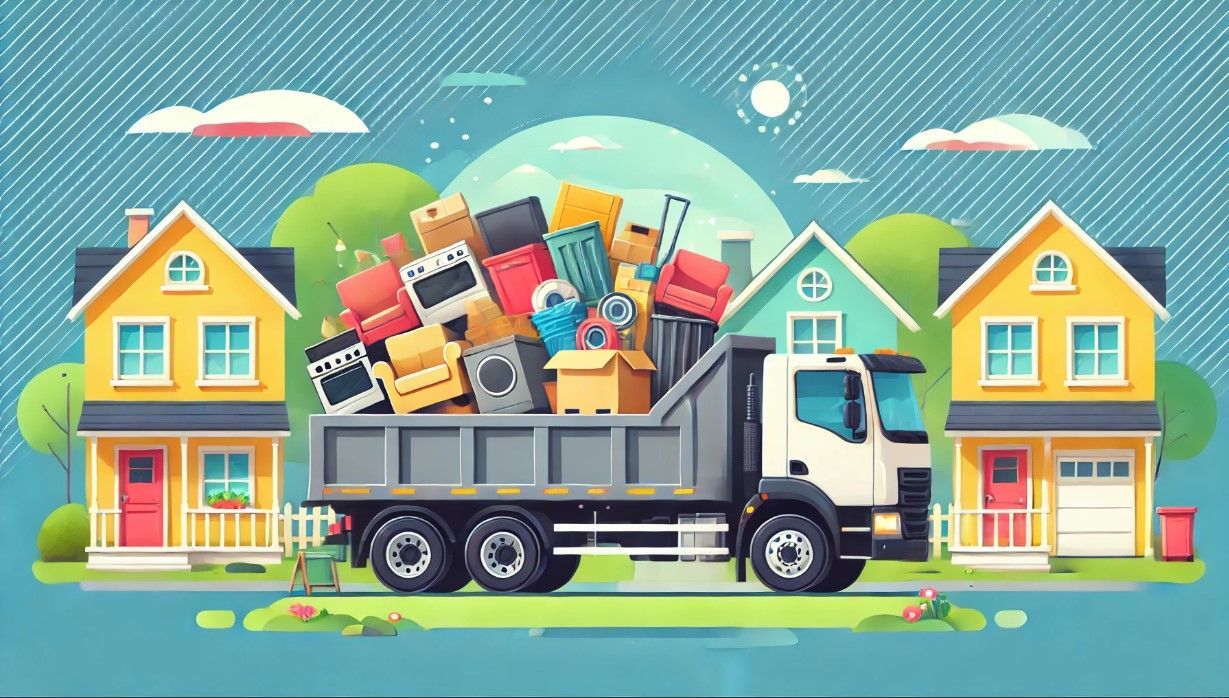The Ultimate Guide to Household Junk Disposal
We all know how quickly junk can pile up in our homes. From old furniture to
unused electronics and those "I'll fix it someday" items, dealing with household junk disposal is something every homeowner faces. But throwing everything away isn’t the most eco-friendly or efficient approach. In this guide, we’ll break down smart ways to declutter, recycle, and dispose of junk responsibly, helping you create a cleaner and more organized living space.
What is Household Junk Disposal?
Household junk disposal is the process of sorting, removing, and disposing of unwanted items from your home. This can include anything from broken appliances to old magazines, electronics, and leftover renovation materials. The main goal is to clear space in a way that is efficient, safe, and environmentally responsible.
Why Proper Household Junk Disposal is Important
- Declutters Your Space: A clean, clutter-free home is not only more spacious but also more comfortable and stress-free.
- Promotes a Safe Environment: Removing old, broken items reduces safety hazards and makes your living area more accessible.
- Environmental Responsibility: By recycling and donating, you minimize the environmental impact of waste and promote sustainable living.
- Improves Mental Well-Being:
A tidy, organized home can have a positive impact on your mental health, reducing anxiety and stress.
Step-by-Step Guide to Household Junk Disposal
1. Sort Your Junk into Categories
Divide your items into distinct categories for easier disposal:
- Keep: Items you use frequently and are in good condition.
- Sell/Donate: Usable items that can be given to charity or sold.
- Recycle: Materials like paper, plastics, glass, and electronics.
- Trash: Items that are broken, irreparable, or have no use.
| Category | Examples |
|---|---|
| Keep | Tools, kitchenware, seasonal clothes |
| Sell/Donate | Furniture, toys, books, gently-used clothes |
| Recycle | Plastic bottles, cardboard, aluminum cans, e-waste |
| Trash | Damaged items, worn-out furniture, food waste |
2. Identify Items for Donation or Sale
Give your items a second life by donating them to charities or selling them on online marketplaces. Look for local donation centers, thrift stores, or community organizations that accept gently-used items.
3. Recycle Whenever Possible
Recycling helps reduce waste and conserve resources. Here are some common recyclable household items:
- Paper: Newspapers, magazines, cardboard boxes
- Plastic: Bottles, containers, packaging
- Metal: Aluminum cans, tin, steel items
- Glass: Bottles, jars, glassware (if clean and unbroken)
- Electronics (E-Waste): Phones, computers, small appliances (check local e-waste recycling programs)
Tip: Research local recycling programs to understand what items they accept and any specific requirements (e.g., rinsing containers, removing labels).
4. Handle Hazardous Materials Safely
Some household items, like old paint, batteries, and cleaning chemicals, are classified as hazardous waste and require special handling. Contact your local waste management service to learn how to dispose of hazardous materials properly.
5. Use a Household Junk Removal Service
If you have a significant amount of junk or heavy items, hiring a
professional junk removal service
can make the process easier and quicker. They handle all the lifting, hauling, and disposal, ensuring that items are recycled, donated, or disposed of responsibly.
Benefits of Hiring a Household Junk Removal Service
| Benefit | How It Helps You |
|---|---|
| Convenience | Professionals do all the heavy lifting and transport |
| Quick and Efficient | Same-day or scheduled pickups; fast removal |
| Responsible Disposal | Sorting and disposing items correctly (recycle, donate, trash) |
| Saves Time and Effort | Reduces the time spent on sorting, packing, and hauling junk |
Tips for a Successful Junk Disposal Process
- Declutter Room by Room: Tackle one room at a time to avoid feeling overwhelmed. Start with areas like the garage, attic, or basement where junk tends to accumulate.
- Use Clear Bins or Bags: Store sorted items in labeled bins or bags to keep everything organized and make disposal easier.
- Get the Whole Family Involved: Encourage everyone in the household to sort through their belongings. It’s a great way to teach kids about organizing and responsible disposal.
- Plan a Yard Sale for Extra Cash: If you have a lot of items that are still in good condition, consider hosting a yard sale or selling items on platforms like eBay, Facebook Marketplace, or Craigslist.
FAQs on Household Junk Disposal
Q1: How do I get rid of large items like furniture and appliances?
A: You have a few options: hire a junk removal service, donate to charities that accept furniture, or schedule a bulk pickup with your local waste service (if available).
Q2: Can I recycle electronics like old TVs and computers?
A: Yes, but these items require special disposal due to their components. Many electronic stores and community centers have e-waste recycling programs.
Q3: Are there restrictions on what items a junk removal service will take?
A: Generally, services will take most household items. However, they may not handle hazardous materials like chemicals, paint, or asbestos. Always confirm with your chosen service.
Q4: What should I do with expired medications or old prescription bottles?
A: Never throw medications in the trash or flush them down the toilet. Instead, take them to a pharmacy take-back program or contact your local waste management for proper disposal.
Common Mistakes to Avoid in Junk Disposal
- Not Checking Local Regulations: Some cities have specific rules for disposing of certain items. Always check with your local waste management service.
- Mixing Recyclable and Non-Recyclable Items: Mixing materials can contaminate recycling loads, so always sort properly.
- Holding on to "Just in Case" Items: If you haven't used it in the last year, it's likely time to let it go.
Sustainable Practices in Household Junk Disposal
Being eco-friendly is not just about recycling—it's about making thoughtful choices throughout the junk disposal process.
1. Repurpose or Upcycle Items
Before tossing something, see if you can give it a new use. Old jars can become storage containers, and worn-out t-shirts can be turned into cleaning rags.
2. Compost Organic Waste
Food scraps and yard waste can be composted to create nutrient-rich soil for your garden. Even if you don't have a yard, many cities have community composting programs.
3. Choose Reusable Over Disposable
When replacing items, opt for reusable or long-lasting alternatives. Swap out disposable plastics for glass containers, cloth bags, and metal straws.
Declutter Your Home Today
Ready to tackle your household junk? Start by sorting through one room at a time, recycling what you can, and considering a
junk removal service for those big items you can't manage on your own. Do you have tips for dealing with household junk? Share your story or ideas in the comments!
Contact us
If you have any questions or need any assistance after business hours, please get in touch.
Phone
BUSINESS HOURS
- Monday
- -
- Tuesday
- -
- Wednesday
- -
- Thursday
- -
- Friday
- -
- Saturday
- -
- Sunday
- Closed
All Rights Reserved | Alpha Dog Junk Removal


